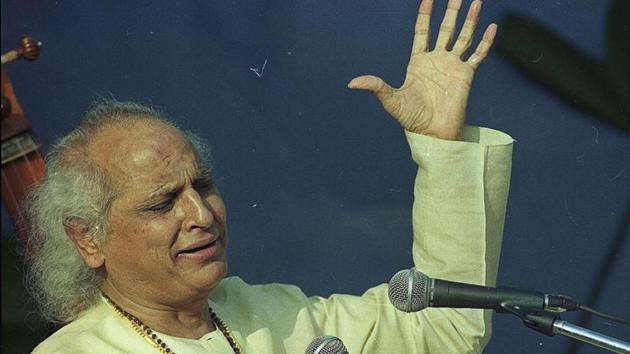India will always owe a huge debt to Pandit Jasraj | Opinion
A true scholar and a treasure-house of Ragas, Pandit Jasraj was a great composer, scholar and performer
Sangeet Martand Pandit Jasraj, the incomparable voice of Hindustani classical music that India gave to the world, will always shine bright as the pole star in the world of music. His loss has left a void that is impossible to fill. He was the last of the five pillars of Hindustani classical music in the past half-century or more, the others being Pandit Mallikarjun Mansur, Pandit Kumar Gandharva, Gaan Saraswati Kishori Amonkar and Pandit Bhimsen Joshi.

Owing to his close ties with my family, I have rich memories of him. Pandit Jasraj had a special bond with my parents, Pandit Vinaya Chandra Maudgalya and Smt. Padma Devi. His debut concert in Delhi at the Gandharva Mahavidyalaya’s annual music festival, Pandit Vishnu Digambar Jayanti Sangeet Samaroh, in 1966 at Sapru House, set him apart as a rising star and he never looked back.
I remember how, as a boy of 10, I awaited eagerly, Pandit Jasraj’s visits to our house-cum-Gandharva Mahavidyala at Connaught Place. There were many visiting musicians and each was special, but Pandit Jasraj’s visits made the atmosphere convivial and festive. I was especially fascinated by the fragrance of the henna-scented itar (perfume) that emanated from his suitcases.
He taught me music, of course. But I learnt so much more, sitting behind him playing the tanpura or travelling with him to music festivals outside Delhi. As he enthralled audiences, the learned and the lay alike, I absorbed invaluable lessons in the technicalities of stage singing, presentation skills to diverse audiences, and coordinating and synchronising with extremely accomplished accompanists who were great musicians in their own right. His first LP, with Ragas Nat Bhairav, Hamsadhvani and Shuddh Varaali, made a deep impression on me in my teens.
His style was unique, almost a whole world unto itself. Being hugely popular, it is lost on many how difficult his style is and what tremendous rigour had gone into mastering it. Pandit Motiram’s son, Pandit Jasraj started his music training under his elder brother Pandit Maniram, in the Mewati gharana.
But in my opinion, his was a combination of the Mewati Gharana along with Ustad Abdul Wahid Khan Saheb’s, Ustad Amir Khan Saheb’s and the Patiala gharana styles, which he turned into a unique gayaki with his powerful multi-octave range, vocal technique such as his famous glides through the notes across octaves, and a special ability to deliver the lyrics with the lucidity of poetry, yet loaded with music. Laden with bhaava (emotion) and laya (rhythm), his music brimmed with a romanticism that mesmerised audiences. He had an uncanny way of engaging each listener. I remember how, during a full concert, one famous musician sitting in the audience, got up to leave after the first two pieces. Panditji noticed this and immediately, in his smiling manner, broke into a bandish (melodic composition) addressing the exiting gentleman, “hum ko bisaar kahaan chale” (whither do you go, forgetting me), in Raga Nagad-dhvani Kanhada, which so genially stopped the musician in his tracks following which he went back to his seat.
Bestowed with a magical and mellifluous voice, Panditji won the hearts of listeners as a great performer. The world of music also knows that his depth of knowledge was immense. Ask him about any composition from any gharana, he would know the entire history and background about it. A true vidwaan (scholar), he was a treasure-house of Raga-knowledge and compositions, himself being a great vaaggeyakaar (composer, scholar and performer rolled into one). He created a new intriguing performance style called Jasrangi based on the concept of murchhana, where a male and a female singer performed a selection of two complementary ragas together.
He rarely sang thumris, dadras or even taranas in concerts, but was an expert in these genres as well and his disciples are well-trained in all these forms of singing. He sang a lot of devotional music, making the maha-mantra “Om Namo Bhagavate Vaasudevaaya” popular in every household. That he was a very generous teacher and encouraged his students in every way, is evident from the extent to which his disciples have attained success in the tough terrain of classical music.
Exuding positivity, Panditji’s was a persona that left behind joy and mirth wherever he went. Warmth and a great sense of humour were intrinsic to his nature. Despite being such a sought-after artist, he was always willing to sing without bothering about remuneration. He would readily travel to remote parts of the country to sing for whoever invited him with sincerity and simplicity.
It would be an understatement to say that Padma Vibhushan Sangeet Martand Pandit Jasraj’s voice will always echo in the hearts of music lovers, touching every emotional chord deeply, and that the genius of his music will forever make India proud.
Madhup Mudgal is a renowned Hindustani classical vocalist, Principal of the Gandharva Mahavidyalaya in New Delhi and recipient of the Padmashri and Sangeet Natak Akademi Award.
The views expressed are personal.






